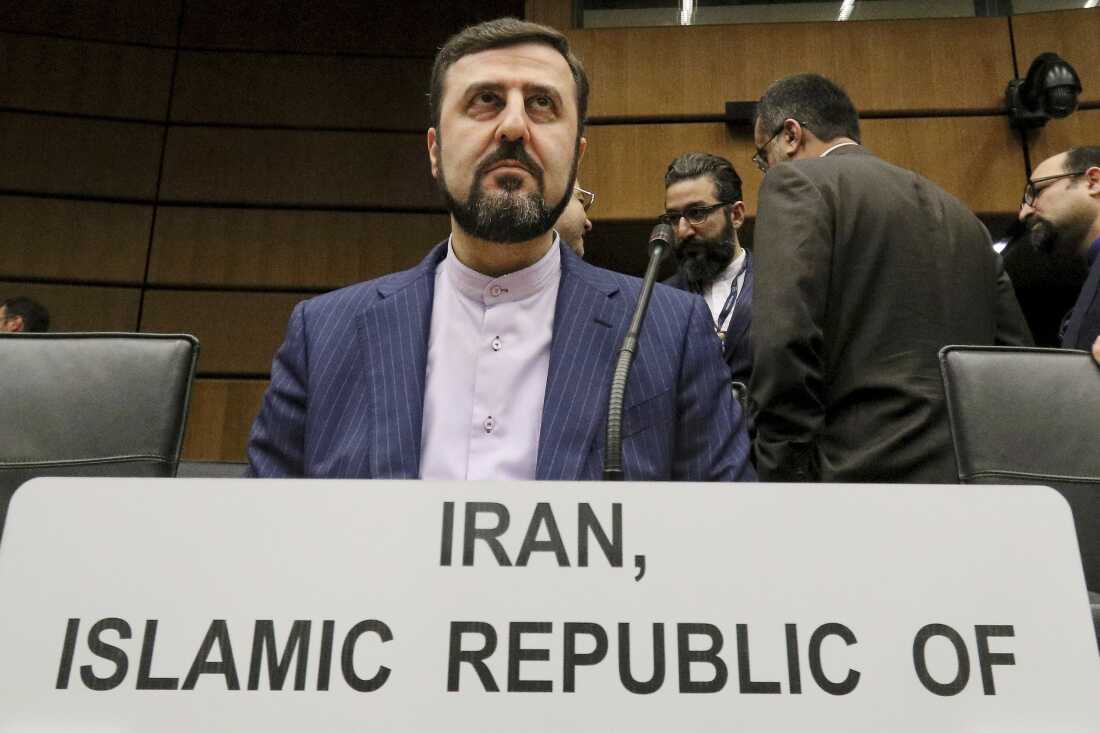Iran’s deputy overseas minister, Kazem Gharibabadi, then the nation’s envoy in Vienna, awaiting the beginning of the Worldwide Atomic Power Company board of governors assembly in Vienna, Austria, Nov. 21, 2019.
Ronald Zak/AP
conceal caption
toggle caption
Ronald Zak/AP
Germany, France and the UK will maintain talks with Iran in Istanbul Friday, simply days after the three European nations warned they’d reimpose stiff sanctions on Tehran if it failed to indicate severe progress on curbing its nuclear actions.
The strain by the Europeans is a part of an effort to revive nascent nuclear talks between america and Iran. The 2 nations had met 5 instances earlier than Israel and the U.S. bombed Iranian nuclear websites in June.
“There has been great concern in Europe about how to get back to something that looks more like nuclear diplomacy with Iran and less direct kinetic conflict,” says Ian Lesser, a distinguished fellow with the German Marshall Fund of america, based mostly in Brussels. “I think that’s very much what’s driving this.”
France, Germany and the U.Ok. — together with the U.S., Russia, China and the European Union — negotiated the Joint Complete Plan of Motion (JCPOA), an settlement reached with Iran in 2015 to rein in its nuclear program in alternate for sanctions aid.
President Trump withdrew the U.S. from the deal in 2018 throughout his first time period, and reimposed sanctions. In January, he reached out to Iran saying the U.S. wished to strike a brand new nuclear deal.
Since then, the opposite nations have taken a again seat, says Trita Parsi, government vp of the Quincy Institute for Accountable Statecraft, a a assume tank in Washington, D.C.
“When it comes to the nuclear file right now, the European role is much, much less because the U.S. is essentially doing this on its own,” he says. “It’s not coordinating with the Europeans and the Europeans don’t have much leverage.”
Parsi, creator of Shedding an Enemy: Obama, Iran, and the Triumph of Diplomacy, says the realm the place the Europeans do have leverage is the flexibility to reinstate sanctions.
Underneath the JCPOA, any participant can start reimposing the remaining United Nations sanctions if Iran is discovered to be noncompliant of the deal. They’re often called “snapback” sanctions.
France’s overseas minister, Jean-Noël Barrot, mentioned France and its companions are justified in reimposing world embargoes on arms, banks and nuclear gear that have been lifted 10 years in the past.
“Without a firm, tangible and verifiable commitment from Iran, we will do so by the end of August at the latest,” he mentioned.
Iranian Overseas Minister Abbas Araghchi has reacted to the specter of a renewed sanctions saying the European nations haven’t any authorized standing to make use of JCPOA’s snapback measure.
The three European nations set to fulfill with Iran — often called the E3 — need Iran to renew working with the Worldwide Atomic Power Company (IAEA). Its inspectors left Iran when Tehran suspended cooperation after the U.S. focused nuclear websites in June. The Europeans additionally need Iran to re-engage in concrete negotiations about limiting or erasing its uranium enrichment capabilities.
Suzanne DiMaggio of the Carnegie Endowment for Worldwide Peace says the specter of snapback might give the Europeans leverage, however reimposing worldwide sanctions towards Iran would dramatically heighten tensions and sure shut down the prospect of future engagement.
“Instead, the E3 should prioritize creative approaches such as establishing a process to rebuild cooperation between Tehran and the IAEA in exchange for an extension on snapback,” she says. including that if such an understanding is reached, it may start to clear a path towards restarting U.S.-Iran talks.
DiMaggio, who has an extended historical past of involvement with unofficial dealings with Iran and different nations to advertise negotiations, says the challenges forward are “immense because the level of distrust is so high.”
Reimposing U.N. sanctions would hit Iran’s financial system — already hobbled by years of worldwide sanctions — exhausting.
Lesser, with the German Marshall Fund, says Iran has its personal guidelines going into the talks. One is to protect its proper to counterpoint nuclear materials, which Iranian leaders say is for peaceable, civilian functions. Impartial specialists mentioned Iran had developed sufficient materials to construct a number of nuclear weapons, earlier than the Israeli and U.S. bombardments.
“The second concern will be to, somehow through nuclear diplomacy … get some sort of security guarantees that would ensure them against further strikes,” Lesser says.
On Thursday, Iranian Deputy Overseas Minister Kazem Gharibabadi mentioned Iran was prepared to have interaction in talks on its nuclear program with the U.S., however provided that Washington took significant steps to rebuild belief.
Nonetheless, there could also be splits inside the Iranian authorities over what to do. Some reasonable members might need to resume nuclear talks to stop a snapback of sanctions or one other strike by the U.S. or Israel.
Arduous-liners in Tehran, angered by the U.S. and Israeli bombing of Iran’s nuclear websites, might vote to push forward with constructing a bomb.
Analysts say it is unlikely there shall be an ironclad settlement popping out of Friday’s talks, however preserving the diplomatic door open is a optimistic step.







